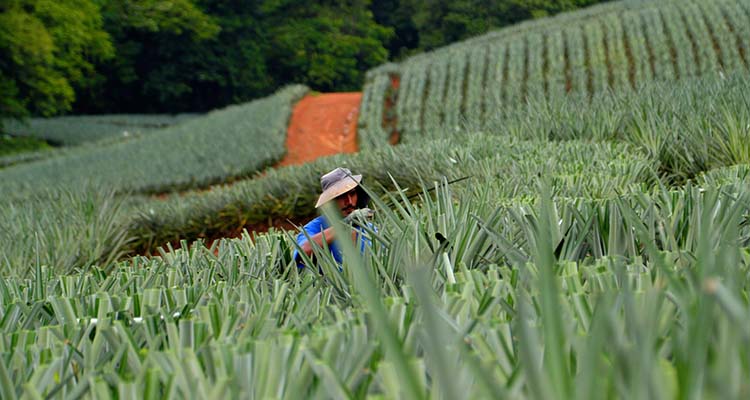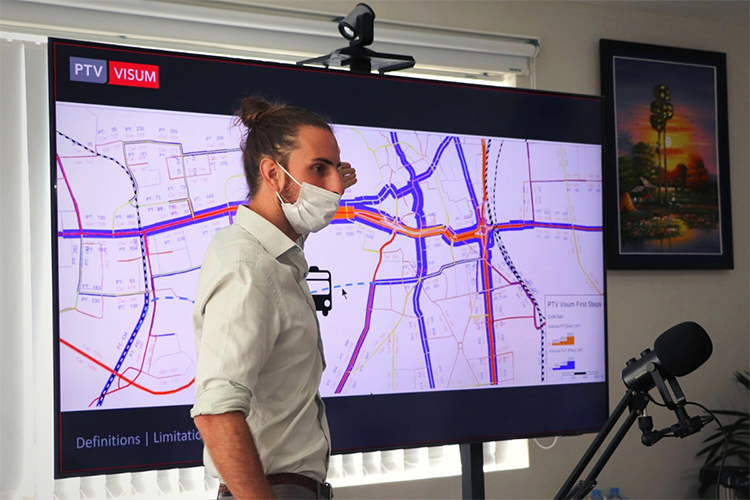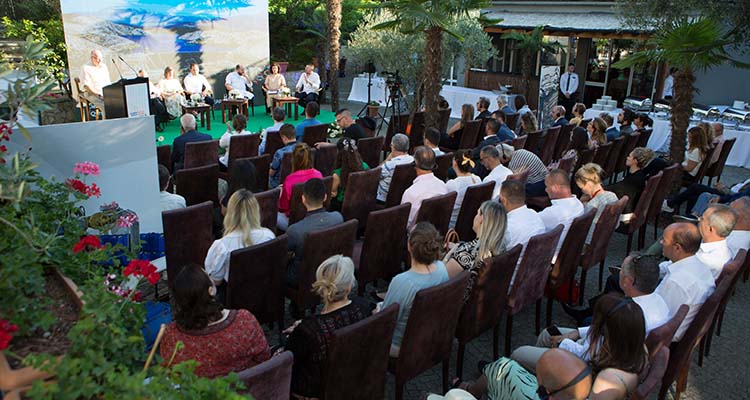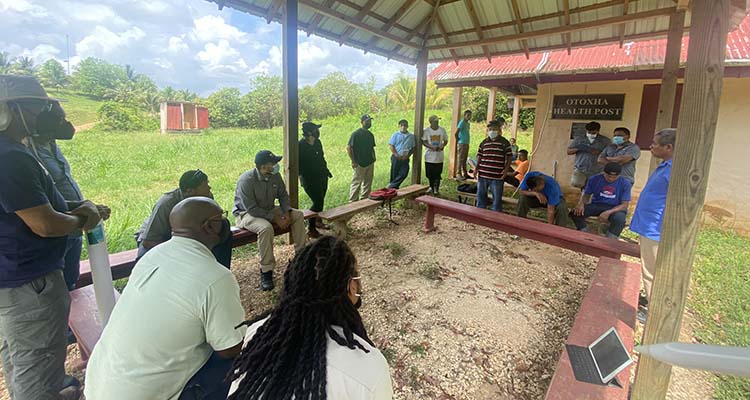GFA NEWSLETTER 02/2022: THE EUROPEAN GREEN DEAL
Editorial
 When the Russian aggression in Ukraine began in winter 2022, it appeared that fighting climate change would be marginalized. The front pages of news portals questioned whether Germany and Europe could afford this topic at all.
When the Russian aggression in Ukraine began in winter 2022, it appeared that fighting climate change would be marginalized. The front pages of news portals questioned whether Germany and Europe could afford this topic at all.
By spring 2022, it became clear that the war was leading to a re-shaping of the approach to energy security globally. There were calls for a revival of the use of coal and other fossil fuels to compensate for broken or unreliable supply chains. The issue of climate change lacked the urgency to position a rapid transition to renewable energy resources as the indisputable solution.
Now in the summer of 2022, Germany and Europe face similar conditions that other regions of the world have been facing more frequently, and for more extended periods - heat waves, droughts, and bushfires that surpass all historical precedents. Suddenly, the challenges of climate change are back in the public debate and literally on our doorstep.
For us at GFA, it is clear that there is no way to avoid or step back from a comprehensive green transition. The transition applies to all sectors of society and the economy - clean energy supply, energy efficient homes and appliances, de-carbonization of all economic sectors, sustainable agriculture, biodiversity, clean air, and circular economy, one health, and many other subsectors.
The European Green Deal is the European Union policy approach that provides the framework and the resources for Europeans to contribute to solving the global climate change challenges. It is also clear to us that the EU approach must work on an international level, and that we must collaborate with developing countries and emerging economies to jointly shape the green transition.
With this newsletter, we would like to highlight the practical methods being used to implement the European Green Deal Approach in our partner countries, and how we, as GFA, contribute to this goal.
Anja Desai, Managing Director
European Green Deal – GFA contributes to global green transition
Ulrich Theuerkauf
The European Green Deal underscores the EU’s commitment to becoming climate neutral by 2050, as part of its contribution to the Paris Agreement. The Green Deal also has strong external ramifications. GFA contributes to the external dimension of the Green Deal.
Adopted in 2020, the European Green Deal is a set of policy initiatives by the European Commission with the overarching aim of making the European Union climate neutral by 2050. It is a growth strategy that aims to transform the EU into a fair and prosperous society with a modern, resource-efficient, and competitive economy - an EU that has eliminated net emissions of greenhouse gases and decoupled economic growth from resource consumption.
The relevance and urgency of the European Green Deal have become more apparent in the face of increasingly dramatic climate change and the Russian aggression in Ukraine. As an intermediate step toward climate neutrality, the EU has raised its 2030 climate ambition with the Fit for 55 package, committing to cutting emissions by at least 55% by 2030. The REPowerEU Plan adopted in May 2022 focuses strongly on an accelerated roll-out of renewable energy and rapidly increased energy efficiency. The EUROPEAN GREEN DEAL continually adapts to dynamic changes in underlying conditions.
The European Green Deal contains an explicit international dimension relevant to global development cooperation and the EU’s economic diplomacy. Each of the European Green Deal policy areas is reflected in programs and projects implemented in developing and threshold countries as part of the EU International Partnership Programmes, particularly NDICI Global Europe and IPA.
As one of the leading economic powers with a high level of global interconnection, the EU assumes responsibility for the worldwide response to climate change for two reasons. First, the accumulated historical emissions of the EU member states far exceed those of the Global South. And secondly, the aspired model of a climate-neutral society can only work on a global scale.
GFA Group provides outstanding services in the same strategic business areas as promoted by the European Green Deal, which is reflected in our decentralized structure of globally operating technical departments and business units. The European Green Deal aims to improve the health and well-being of citizens and future generations according to the values below. In this newsletter, we present project examples showing how GFA Consulting Group contributes to each of these priorities.
#Sustainability #greendeal @SDGs @EU
FROM FARM TO FORK - MAINSTREAMING BIODIVERSITY IN AGRICULTURAL VALUE CHAINS IN THE DOMINICAN REPUBLIC AND COSTA RICA
Marion Büttner
100 farmers in Costa Rica and the Dominican Republic took part in a GFA project to propose and develop sustainable banana and pineapple farming. The GIZ program “From Farm to Fork” aims at integrating biodiversity and ecosystem services in these countries value chains.
At the beginning of the project, GFA held two competitions inviting the submission of ideas to promote biological diversity. Numerous banana and pineapple producers participated and submitted wide-ranging proposals, e.g., introducing organic chicken farming in banana plantations or using drones to reduce water consumption or to apply organic input on fields. Finally, 32 farms from the 100 participating farms in both countries were selected. Currently, a third competition is underway, which will increase the number of projects to be supported to 40.
The producers receive technical advice, material, and equipment for the implementation of their projects. Public support ranges from US$10,000 to US$25,000 per project idea, while beneficiaries contribute with their own capital and workforce that may more than double the amount of the sponsorship. GFA team leader, Emilie Dardaine, is responsible for managing the biodiversity innovation fund and for coordinating the projects on behalf of GIZ. "As projects are being implemented,” she notes, “we assess the benefits they bring to the environment and the business as well as the challenges faced. This is valuable information for scoping the project and scaling up initiatives”.
Among the innovative initiatives for more sustainable production that promote biodiversity, four thematic areas stand out: setting up biological corridors that provide safe passage for wildlife between separate protected areas; using advanced technology in agriculture; reducing the impact of agrochemicals on biodiversity; and measuring and reducing water and carbon footprints.
The project's success is closely linked to the commitment of the participating companies and associations. As the projects are based on the implementation of their own ideas, the participants are highly dedicated.
The program ‘From Farm to Fork’ is implemented by the Deutsche Gesellschaft für Internationale Zusammenarbeit (GIZ), and financed by the German Federal Ministry for the Environment, Nature Conservation and Nuclear Safety (BMU-IKI). The political partners include the Ministry of Environment and Energy in Costa Rica, (MINAE), and the Ministry of Environment and Natural Resources in the Dominican Republic.
Former news about From Farm to Fork:
From Farm to Fork in Costa Rica and the Dominican Republic - four innovation trends From Farm to Fork in Costa Rica and the Dominican Republic – Competition for ideas
GFA launches contest of ideas for preserving biodiversity
Mainstreaming biodiversity in agricultural value chains in Dominican Republic and Costa Rica
#CostaRica #FromFarmToFork #Agriculture @GIZ
On the Fast-track to climate neutrality
Dietram Oppelt
With our work advising countries on meeting their Nationally Determined Contributions (NDC) targets and pathways to zero emission as part of the long-term low emission development strategies (LT-LEDS), we are making a meaningful contribution towards reaching global climate targets.
HEAT currently advises several countries and supports them on their journey to zero emissions. These projects include GIZ and UNDP projects in Lesotho, Botswana, Tunisia, Brazil, and Vietnam on their Nationally Determined Contributions (NDCs) and long-term low emission development strategies (LEDS). In the recent Intergovernmental Panel on Climate Change (IPCC) report, the newest Assessment Report (Working Group3) pointed out that we urgently need to half global emissions by 2030 and reach zero emissions as soon as possible.
Current commitments of countries as part of the NDCs are insufficient, and governments need to make additional efforts to secure sectoral mitigation pathways toward zero emission. Such measures include ending the use of fossil fuels; generating electricity from renewable energy; switching transport towards pedestrians, bicycles, and zero-emission vehicles (electric vehicles); increasing the use of zero-emission steel and cement; ending deforestation; and lowering agriculture emissions, mostly related to cows. HEAT supports various countries, e.g., in modeling pathways to reach zero emissions, providing tools for tracking emission reductions, and policies suitable for supporting the transition to zero emissions.
Learn more about HEAT International, a member of GFA Group.
#NDC #LEDS #Climate #zeroemission @GIZ @UNDP
Sustainable Mobility in Metropolitan Regions (SMMR Phase II)
Rafael Romao-Freitas
(Photo: Conrad Richardson, GFA long-term expert)
The transport sector is responsible for around a quarter of total energy-related greenhouse gas emissions in the ASEAN region. SMMR is part of the solution to that problem.
Half of the 669 million citizens of ASEAN Member States live in the region’s rapidly growing cities. As a result, urban mobility needs are growing, and traffic is increasing. This creates metropolitan regions that are characterized by numerous interactions between core cities, adjacent settlements, and the wider surrounding area. It is necessary to enhance local decision-makers’ understanding of sustainable mobility approaches, and improve models for cooperation across boundaries and government agencies.
The Sustainable Mobility in Metropolitan Regions (SMMR) project is being implemented by GFA Consulting Group and consortium partners on behalf of GIZ. SMMR works on four levels:
- With ASEAN, developing policy papers to guide the implementation of the Kuala Lumpur Transport Strategic Plan and Regional Strategy on Sustainable Land Transport,
- with thematic networks and common projects among metropolitan regions in the ASEAN Member States,
- with lighthouse projects in focus regions, providing good practice for innovative sustainable transport systems, and
- with capacity-building measures.
With the support of SMMR I, ASEAN has issued two policy documents to assist national and local authorities in developing new forms of metropolitan scale institutional cooperation and of participatory integrated planning. The toolbox for the establishment of Metropolitan Transport Executives (MTE) and the ASEAN guidelines for Sustainable Urban Mobility Plans (SUMP) are available on the ASEAN and https://smmr.asia websites.
SMMR II supports ASEAN in the development of additional policy papers for Green Freight and Urban Logistics and Electric Vehicles. SMMR also strives to further develop and implement innovative lighthouse projects such as the cross-border cable car between Vientiane (Lao PDR) - Nong Khai (Thailand) and the inter-provincial bus corridor between Can Tho City and neighboring provinces in the Mekong Delta.
#ASEAN #SUMP #Mobility #Climate #Sustainability #Transport @GIZ @SMMR
GFA AND THE CIRCULAR ECONOMY CHALLENGE
Barbara Kowalczyk-Hoyer & Claudia Martens
GFA has been implementing green economy projects for more than 20 years, with the transition to a Circular Economy becoming one of the central themes and a major challenge for the next decade.
Moving from the linear “take-make-dispose” economy toward the circular “make-use-recycle” system is a global necessity and one of the most significant challenges of our times.
The transformation towards a circular economy strives at sustainability at each stage of the economic product cycle: from raw material extraction through product design, manufacturing and distribution, up to sustainable consumption that minimizes waste, followed by the collection and recycling of waste. The idea is to focus on the maintenance of materials throughout the entire economic cycle and on integrated waste management, with the objective of reducing both material consumption, and greenhouse gas emissions. Such a transformation requires a change in knowledge, attitudes, and practices among stakeholders at all political, economic, and civil society levels. Companies need to re-design products, citizens must change their consumption habits, municipalities have to provide waste-collection and recycling capacities, and governments must develop and implement relevant laws, regulations, and market-based instruments such as tax incentives.
Such changes are strongly encouraged and supported by national and international development institutions. GFA Consulting Group offers technical competence and assistance in implementing relevant programs worldwide. Our business units provide services for all aspects of the circular economy, including value chain analysis; the development of innovative business models, waste management and recycling concepts; policy advice; training and capacity building; and financial solutions for a green economy. The most recent examples of GFA’s circular economy projects are:
Refrigerator Recycling in Brazil, financed by GIZ, implemented by HEAT – a company of the GFA Group.
Climate Sensitive Waste Management in Serbia, financed by GIZ, implemented by the GFA Water, Sanitation and Waste Management (WSWM) department.
Reducing Plastic Waste in the Americas Program (CPAP) in Brazil and Colombia, financed by the EU, implemented by the GFA Private Sector Development (PSD) department.
Project video English | Spanish | Portuguese
Project website | Project on LinkedIn
Detailed information about these projects is described in our factsheet CIRCULAR ECONOMY.
Green action in enterprises - Creating a Green Business Development Ecosystem in Jordan
Victoria von Rosenberg
Within the framework of the GIZ-funded GAIN project, which started in 2021, GFA supports Jordanian companies to improve conditions in production. This affects sustainability by making production more environmentally friendly and by conserving resources.
The target sectors of the project are food processing, pharmaceuticals, chemicals, textiles, and packaging. Medium to large industrial companies are the focus of this initiative since they are considered the large polluters in Jordan, in terms of waste generation, water and energy usage, and greenhouse gas emissions.
The project applies a multilevel approach. It aims to strengthen the capacities of selected service providers in environmentally friendly and resource-efficient production. In addition, the project works directly with the target companies in implementing measures to protect the environment and save resources. With this approach, the project consolidates capacity-building measures at the meso level by coaching and guiding service providers to deploy advisory services to companies. A demand and supply study on green business development services helps to investigate the status quo and current gaps at the start of the project, while the main project implementation phase is complemented by awareness-raising measures for environmentally-friendly and resource-efficient production.
#Waste #Recycling #CircularEconomy #Climate #GreenDeal #Jordan #Brazil #Colombia #Serbia @GIZ @EU @Heat
TRANSBOUNDARY BIOSPHERE RESERVE – PRESERVING ONE OF THE EUROPE’S NATURAL GEMSTONES
Constanze Schaaff
The EU biodiversity strategy aims to support a green recovery by 2030. The Prespa project contributes directly to that goal by enhancing biodiversity conservation and fostering socio-economic development.
The EU Biodiversity Strategy, as a core part of the EU Green Deal, recognizes the enormous benefits of biodiversity for society and, by extension, for life on earth. It is an ambitious and long-term plan to protect nature, reverse the degradation of ecosystems, and push Europe toward a green recovery by 2030.
Ohrid-Prespa is an exceptional region on the European continent due to its valuable natural and cultural heritage. On the Albanian side, its significance for conservation is acknowledged through its protected area status as the Ohrid-Prespa Transboundary Biosphere Reserve and the Prespa National Park. The ecosystems of the lakes of Small and Great Prespa and Ohrid Lake form part of the wider Mediterranean global hotspot of biodiversity. In fact, the lake systems are considered among the most important sites of freshwater biodiversity in Europe. They are of extraordinary importance for sedentary and migratory birds. In response to threats to the Prespa region`s aquatic and terrestrial ecosystems, the Federal Republic of Germany has committed to supporting the Albanian government in the preservation of the natural and cultural values through the project Transboundary Biosphere Reserve Prespa, Phase II.
The project started in May 2018 and will be completed in December 2022. It is co-financed by KfW Development Bank and implemented by GFA and the Institute for Nature Conservation of Albania. It recognizes that successful biodiversity conservation and environmental protection of the region can only be achieved by firmly addressing the socio-economic problems and by supporting sustainable development in the Prespa National Park and its adjacent communities.
Project activities include investments in ecotourism, fishery and agriculture, sustainable forest management, environmental education, energy efficiency measures, and wildlife monitoring and rehabilitation.
More news about the project:
Visit of the PRESPA project in Albania on the occasion of GFA´s 40th anniversary
German Ambassador visited Transbondary Bipsphere Reserve PRESPA in Albania
Eagle Mati and curly pelican Zaveri - good news from PRESPA in Albania
Threatened Golden Eagle tagged and released in Prespa National Park in Albania
GFA backstopper visits Transboundary Biosphere Reserve Prespa project in Albania
Earth Day celebration in Prespa National Park in Albania
BMZ visits Transboundary Biosphere Reserve Prespa project
Prespa Winter Fest on International Wetland Day
Video published about the events on support to the the Ohrid-Prespa region in Albania
Sustainable tourism in the Ohrid-Prespa region in Albania
Presenting Prespa Ohrid Nature Trust and Transboundary Biosphere Reserve project in Tirana
#BiodiversityConservation #Albania #ProtectedAreas #GreenRecovery #Prespa #Albania
THE EUROPEAN GREEN DEAL – PERSPECTIVES FOR ALBANIA
Constanze Schaaff & Kostian Jano
GFA organized a panel discussion in Tirana, Albania as part of the Group’s 40th birthday celebrations. We brought together stakeholders from politics, the private sector, and the community, alongside donors, to discuss the European Green Deal from the perspective of the EU candidate country, Albania.
The European Green Deal, with its package of policy initiatives, is designed to set the EU on the path to a green transition. The ultimate goal is to make Europe the first climate-neutral continent by 2050. The Western Balkans, including Albania, is one of the regions in Europe most heavily affected by the impact of climate change. A Green Agenda was explicitly created for the region to tackle the effects of climate change. It details five pillars, that are to be pursued through concrete actions and supported by mecha-nisms and financial instruments:
- Climate action, including decarburization, energy, and mobility
- Circular economy, addressing in particular waste, recycling, sustainable production, and the effi-cient use of resources
- Biodiversity, to protect and restore the natural wealth of the region
- Fighting pollution of air, water, and soil
- Sustainable food systems and rural areas.
Digitalization is considered a key enabler for the above five pillars in line with the concept of the dual green and digital transition.
According to the latest progress report by the EU, Albania is moderately prepared in most areas related to the Green Agenda and sustainable connectivity, namely the trans-European networks, energy, and environment and climate change. Some progress has been made in most areas, in particular through revised transport planning and on energy connectivity. However, challenges remain, and more work is needed in enforcing energy and environmental legislation, not least in the protected areas.
During a lively panel discussion that addressed the core issues entailed by the Green Agenda, renowned sector experts examined with very short and concise inputs the opportunities and challenges that Albania faces with the five pillars of the Green Agenda for the Western Balkans offer. Finally, there was the op-portunity for the guests to enter into a dialogue about their views on the European Green Deal.
#EuropeanGreenDeal #Albania #Green Agenda #WesternBalkans
SUPPORTING THE TRANSITION TO MORE SUSTAINABLE ENERGY SERVICES IN BELIZE
Arne Löprick
Helping the people of Belize access clean energy – a collaborative project led by GFA and funded by the EU to provide technical assistance for sustainable energy sources.
GFA Consulting Group is leading a consortium to implement a project to provide technical assistance to the Government of Belize in making the transition to more sustainable energy services. The LAIT UP BELIZE! project is a collaboration between the GFA team and the Energy Unit under the Ministry of Public Utilities, Energy, Logistics, and E-Governance and is funded by the EU under the EU Green Deal and the global commitments of the UN Sustainable Development Goals.
The overall objective of the collaboration is “Universal access to electricity from a clean and productive sector in Belize.” Key elements of the energy transition plan in Belize are highlighted in the Belize Sustainable Energy Roadmap.
The project is currently focused on the following four areas:
- Energy Information and Knowledge Management – for current and accurate information for stakeholders
- Policy and Legislation – to update the National Energy Policy and promulgate an Energy Act to provide the foundation for the policy implementation
- Energy Access – to achieve the national policy objective of Universal Access to Electricity by 2030 (including supporting the national electricity utility company to implement three mini-grids for five villages in rural areas)
- Communication and Visibility – to inform stakeholders of the opportunities and multiple co-benefits in the transition and to provide information for stakeholders to engage actively in the transition
Overall, the collaboration in Belize directly supports the objectives and desired outcomes of the EU Green Deal. GFA Consulting Group is confident that the experience in Belize will confirm the intended benefits for all parties.
Project in briefLait up Belize! on Youtube
Follow Lait up Belize! on Facebook and Instagram
#SustainableEnergy #Belize #GreenDeal @NIRAS @LaitupBelize @EuropeanUnion @SDGs
CREATION OF CONDUCIVE ENVIRONMENT FOR A GREEN HYDROGEN ECONOMY IN SOUTH AFRICA
Ulrich Theuerkauf
GFA provides advisory services covering the entire Green Hydrogen (GH2) value chain, including policy, legal, and regulatory framework, GH2 local and export market assessment, project pipeline development, and capacity building.
Green Hydrogen (GH2) and GH2-based derivatives known as Power-to-X (PtX) are expected to play a key role in the energy transition, especially in the hard-to-abate sectors, such as the steel industry, long-haul road transport, maritime shipping, aviation, and chemicals. Although GH2/PtX can play an important role, its successful development requires the existence of an enabling framework, including a policy and regulatory environment conducive to private investments; institutions with clear roles and responsibilities, rules, regulations and commitments, standards and norms; and appropriate knowledge and skills of actors involved.
To enable the successful development of a GH2 economy, GFA identifies gaps in existing frameworks and supports partner countries in formulating recommendations for adjustments. For instance, in the framework of the H2.SA project (Promoting the development of a hydrogen economy in South Africa), GFA was commissioned by GIZ to develop recommendations for improving the regulatory framework and strategic planning basis in South Africa in the context of a favorable policy for GH2/PtX production, applications and export.
The mission of GFA is broad, and includes the preparation of two in-depth desktop studies. The first study deals with the current planning and policy landscape related to GH2/PtX in South Africa and compares it with international best practices. The second study is concerned with the legal and regulatory framework pertaining to GH2/PtX in South Africa and identifies gaps and overlaps in existing regulations, conflicts between institutions or lack of expertise, and other gaps in the current regulations compared with the international benchmark.
A further focus is the organization of workshops with relevant national stakeholders to identify their needs, goals, and priorities, the preparation of at least six recommendations to improve the strategic planning basis, and at least ten recommendations for improving the legal and regulatory framework for/related to GH2/PtX in South Africa. Finally, GFA aims to validate the recommendations in workshops with relevant stakeholders.
#Green Hydrogen, #PtX, #GH2 Policy Framework, #GH2 Regulatory Framework


































